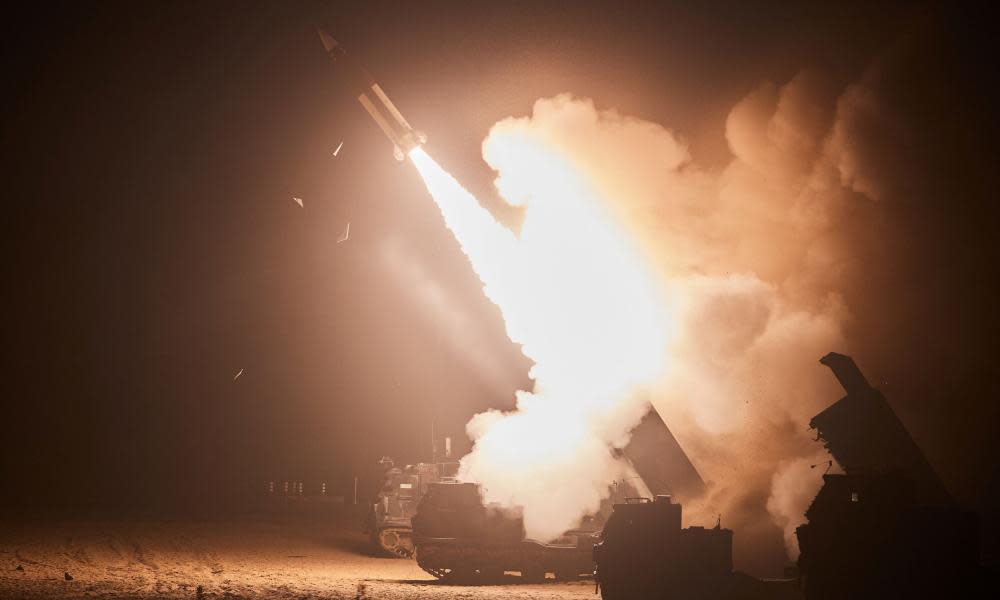US agrees to send long-range missiles to Ukraine in military boost for Kyiv

US president Joe Biden has decided to supply Ukraine with long-range army tactical missile systems (ATACMS), an important boost to Kyiv’s capacity to target Russian military logistics at long range distances as the country prepares for a second winter at war.
Biden told Ukraine’s leader Volodymyr Zelenskiy in a private meeting that a small number of the weapons would be transferred, NBC reported, citing US officials.
Ukraine has been asking for ATACMS for months. Officials in the US were reluctant as the country’s own stockpile is limited and because of fears Russia could accuse Washington of escalation.
But Ukraine will commit not to target Russian territory with them and a waiver allowing the transfer of cluster munitions to Ukraine has expanded the number of potential missiles that could be used there, the Wall Street Journal reported.
Fired from a mobile launcher, ATACMS can hit targets up to 190 miles (300km) away, allowing Ukrainian forces to strike far beyond the front lines. Potential targets include command headquarters, weapons depots and supply networks, including railways.
Asked about reports that Biden had shifted his position, Zelenskiy did not directly respond, saying only that the US was Ukraine’s biggest weapons supplier, Reuters reported.“We are discussing all the different types of weapons – long-range weapons and artillery, shells with the calibre of 155mm, then air defence systems,” Zelenskiy told a press conference during an official visit to Canada.
Ukraine’s acquisition of the ATACMS is the latest in a long-running and largely successful campaign to push western allies for more advanced weaponry, which has been bolstered by Ukrainian military successes on the ground.
When Russia invaded last year, guided anti-tank missiles were among the most hi-tech equipment sent to Ukraine. It now has western tanks, surface-to-air missile defence systems and pilots training to take over a fleet of F-16 fighter jets.
Related: Himars: what are the advanced rockets US is sending Ukraine?
Ukrainian forces are already familiar with the Himars mobile rocket launchers used to fire ATACMS, as the US began transferring these systems last year. However, it only supplied Ukraine with shorter-range guided rockets.
The long-range missiles could be particularly important in winter, when cold weather slows fighting along the frontlines and Russia may try to shore up its defences in occupied Ukrainian territory.
Ukraine launched a counteroffensive this summer that progressed more slowly than the country’s own military and its US allies had hoped.
Kyiv aimed to break through Russian lines, then drive down to the Sea of Azov, isolating invading forces around Kherson and cutting off supply routes to Crimea.
A dense mine belt stalled troops for weeks, however, after it proved impenetrable even to armoured vehicles and tanks from the US and European powers.
Eventually a path was cleared by sappers on foot, and last week, in another key breakthrough, armoured vehicles breached Russia’s main anti-tank defences in the same area.That could allow them to push farther south more easily, or attack Russian forces along defensive lines from the rear.
While the land offensive has advanced slowly, Ukraine has sought to put pressure on Russian forces with long-distance drone and other attacks, both inside Russia and on occupied Ukrainian soil, particularly in Crimea.
Although there was no official announcement on ATACMS during Zelenskiy’s whirlwind visit to Washington last week, he secured $325m in new US aid and worked to reinforce support for his country among politicians.While in Europe support for Ukraine’s war effort is largely bipartisan, in the US there are splits along party political lines, with a faction of congressional Republicans largely aligned with the party’s presidential frontrunner Donald Trump increasingly opposed to funding aid and weapons transfers.

 Yahoo News
Yahoo News 
